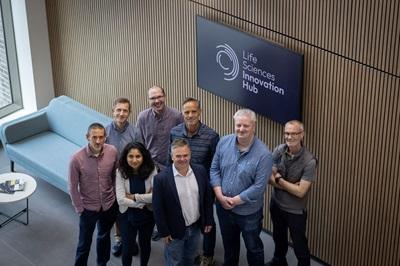
A University of Dundee spin-out has formed a new company dedicated to developing new obesity therapies that avoid the muscle loss often associated with current GLP-1 drugs.
Tay Therapeutics was spun out of the University’s School of Life Sciences in 2020 by Dr Andrew Woodland and Dr Mark Bell. Over the past four years, Tay has built a strong track record in drug discovery, delivering three candidate drugs targeting inflammatory and rare genetic conditions.
Building on this success, the team has now launched a new company – Hawkhill Therapeutics – dedicated to creating oral, muscle-sparing alternatives to multibillion-dollar blockbuster GLP-1 drugs.
While GLP-1 drugs, such as Ozempic and Mounjaro, have been hailed for their anti-obesity properties and potential to prevent the development of related diseases such as diabetes, heart disease and cancer, concerns have also been expressed that a significant percentage of weight reduction comes from the loss of muscle.
Preserving muscle mass is vital for overall health, longevity, and a higher quality of life, particularly as we get older. Muscle mass helps with metabolism, weight management, and reduces the risk of falls and fractures, while also supporting bone health and potentially reducing the risk of chronic diseases.
Hawkhill Therapeutics is addressing this challenge by developing an oral drug targeting a clinically validated mechanism, in line with growing industry interest in muscle-sparing weight loss solutions.
Dr Woodland, CEO of both Tay and Hawkhill, says that he is excited by the potential of the new company.
“We are developing potentially game-changing medicines for patients with obesity that we hope will help patients maintain a healthy weight, while retaining muscle mass and improving their overall health and wellbeing,” he said.
“With 50% of the global population predicted to be obese by 2050 at a cost of trillions of dollars to the world economy, the world needs drugs that confront the scale of the obesity crisis. The Holy Grail is to address the limitations of the current generation of GLP-1s by improving long term tolerability, reducing side effects and retaining muscle.
“We have a strong track record developing innovative treatments and my passion to help patients is what drives me on. Since its inception, Tay has developed three candidate drugs in four years, with less than £15 million funding. This is close to unheard of in our field and it all originated here in Dundee.”
Both Tay and Hawkhill are registered at the new Life Sciences Innovation Hub adjacent to the University. As a lean, virtual biotech with chemistry and biology outsourced to contract research organisations, Hawkhill aims to deliver a clinic-ready candidate at a fraction of the usual cost.
Hawkhill is currently raising investment to advance its promising obesity program. As the company grows, it plans to expand into dedicated office within the Innovation Hub, with lab space to follow in the future.
The Life Sciences Innovation Hub was supported by a £20.2 million Scottish Government investment through the Tay Cities Region Deal as well as by Scottish Enterprise, the Wolfson Foundation, Garfield Weston Foundation, UK Government (through the UK Shared Prosperity Fund) and the University of Dundee.